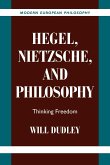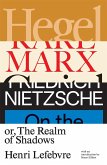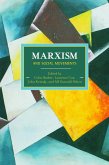- Broschiertes Buch
- Merkliste
- Auf die Merkliste
- Bewerten Bewerten
- Teilen
- Produkt teilen
- Produkterinnerung
- Produkterinnerung
Still the only full-length study of the achievements and limitations of Lenin's extensive writings on Hegel, Hegel, Lenin, and Western Marxism has become a minor classic. In a full critical account, Anderson's book connects Lenin's 'dialectics' to his renowned writings on imperialism, anti-colonial movements, and the state. From there Anderson takes up the extensive debates over Lenin's engagement with Hegel among Marxists as wide ranging as Georg Lukacs, Henri Lefebvre, C.L.R. James, Raya Dunayevskaya, Lucio Colletti, and Louis Althusser. This updated and expanded edition also includes a…mehr
Andere Kunden interessierten sich auch für
![Hegel, Nietzsche, and Philosophy Hegel, Nietzsche, and Philosophy]() Will Dudley (Massachusetts Williams College)Hegel, Nietzsche, and Philosophy55,99 €
Will Dudley (Massachusetts Williams College)Hegel, Nietzsche, and Philosophy55,99 €![Hegel, Marx, Nietzsche Hegel, Marx, Nietzsche]() Henri LefebvreHegel, Marx, Nietzsche31,99 €
Henri LefebvreHegel, Marx, Nietzsche31,99 €![Leo Kofler's Philosophy of Praxis: Western Marxism and Socialist Humanism Leo Kofler's Philosophy of Praxis: Western Marxism and Socialist Humanism]() Christoph JnkeLeo Kofler's Philosophy of Praxis: Western Marxism and Socialist Humanism38,99 €
Christoph JnkeLeo Kofler's Philosophy of Praxis: Western Marxism and Socialist Humanism38,99 €![Marxism and Social Movements Marxism and Social Movements]() Marxism and Social Movements48,99 €
Marxism and Social Movements48,99 €![Hegel, Marx and Vygotsky Hegel, Marx and Vygotsky]() Andy BlundenHegel, Marx and Vygotsky42,99 €
Andy BlundenHegel, Marx and Vygotsky42,99 €![The Philosophy of Living Experience The Philosophy of Living Experience]() Alexander BogdanovThe Philosophy of Living Experience36,99 €
Alexander BogdanovThe Philosophy of Living Experience36,99 €![Theory as History Theory as History]() Jarius BanajiTheory as History43,99 €
Jarius BanajiTheory as History43,99 €-
-
-
Still the only full-length study of the achievements and limitations of Lenin's extensive writings on Hegel, Hegel, Lenin, and Western Marxism has become a minor classic. In a full critical account, Anderson's book connects Lenin's 'dialectics' to his renowned writings on imperialism, anti-colonial movements, and the state. From there Anderson takes up the extensive debates over Lenin's engagement with Hegel among Marxists as wide ranging as Georg Lukacs, Henri Lefebvre, C.L.R. James, Raya Dunayevskaya, Lucio Colletti, and Louis Althusser. This updated and expanded edition also includes a comprehensive new introduction by the author, assessing Lenin's relevance for today's world.
Hinweis: Dieser Artikel kann nur an eine deutsche Lieferadresse ausgeliefert werden.
Hinweis: Dieser Artikel kann nur an eine deutsche Lieferadresse ausgeliefert werden.
Produktdetails
- Produktdetails
- Historical Materialism
- Verlag: Haymarket Books
- Seitenzahl: 384
- Erscheinungstermin: 31. Januar 2023
- Englisch
- Abmessung: 229mm x 155mm x 22mm
- Gewicht: 550g
- ISBN-13: 9781642598223
- ISBN-10: 1642598224
- Artikelnr.: 64696596
- Herstellerkennzeichnung
- Libri GmbH
- Europaallee 1
- 36244 Bad Hersfeld
- gpsr@libri.de
- Historical Materialism
- Verlag: Haymarket Books
- Seitenzahl: 384
- Erscheinungstermin: 31. Januar 2023
- Englisch
- Abmessung: 229mm x 155mm x 22mm
- Gewicht: 550g
- ISBN-13: 9781642598223
- ISBN-10: 1642598224
- Artikelnr.: 64696596
- Herstellerkennzeichnung
- Libri GmbH
- Europaallee 1
- 36244 Bad Hersfeld
- gpsr@libri.de
Kevin B. Anderson is Distinguished Professor of Sociology, with affiliations to Political Science and Feminist Studies at the University of California, Santa Barbara. He is the author or editor of eleven books, including Marx at the Margins.
Table of Contents
Acknowledgments
A Note on Sources and Abbreviations
Introduction to the New English Edition
1 Lenin in the Present Moment
2 Lenin and Hegel Today
3 Lenin and Hegel 1914-22, Some Key Examples
4 Lenin and the Hegelian Marxist Tradition
5 Was Lenin Really a Hegelian Marxist after 1914?
6 Dialectics and Lenin's Theoretical Works after 1914: Did He Really
Reorganise His Thinking?
7 The Antinomies of State and Revolution
8 Which, If Any, Lenin for Today?
9 References
Introduction to the First Edition
Part 1 Lenin on Hegel and Dialectics
1 The Crisis of World Marxism in 1914 and Lenin's Plunge into Hegel
1 The Significance of the Turn to Hegel
2 Marxism and Hegel before 1914
3 Lenin and Hegel before 1914
4 The 1914 Encyclopedia Article 'Karl Marx'
2 Lenin on Hegel's Concepts of Being and Essence
1 Lenin Begins to Read Hegel
2 On 'The Doctrine of Being'
3 On 'The Doctrine of Essence'
3 The Subjective Logic: The Core of Lenin's 1914 Hegel Studies
1 The Notion in General: The 'Self-Conscious Subject'
2 The Syllogism and the Relation of Hegel to Marxism
3 Teleology: Lenin Discovers a Concept of Practice and Labor in Hegel
4 The Idea in General: 'The Very Best Exposition of Dialectics'
5 The Idea of Life: A 'Brilliant' Addition to the Logic
6 The Idea of Cognition: A Turning Point in Lenin's Abstract
7 The Idea of the True as the Theoretical Idea and Hegel's Critique of
Kant's Relativism and Focus on Phenomena
8 Analytic and Synthetic Cognition
9 The Idea of the Good and the Practical Idea
10 The Practical Idea and Lenin's Omission of the Theoretical Idea
11 The Absolute Idea: The Ambivalent Climax of Lenin's Reading of Hegel
4 Lenin's Discussions of the Dialectic, 1915-23: An Ambivalent, Secretive
Hegelianism
1 Interlude: Writings on the War and Revolutionary Defeatism, 1914-15
2 Notes on Other Works by Hegel, 1915: Intelligent Idealism versus Vulgar
Materialism
3 'On the Question of Dialectics': Lenin Critiques Engels
4 Lenin's Public Writings on Dialectics, 1915-23: Hegelian Marxism and
Philosophical Ambivalence
Part 2 Lenin on the Dialectics of Revolution, 1914-23
5 Imperialism and New Forms of Subjectivity: National Liberation Movements
1 Economics and Dialectics in the Analysis of Imperialism
2 Notebooks on Imperialism
3 Marxism and the National Question to 1914
4 Lenin on the Dialectics of National Liberation, 1916-17
5 Continuation of the Debates over National Liberation after the
Revolution
6 State and Revolution: Subjectivity, Grassroots Democracy, and the
Critique of Bureaucracy
1 State and Revolution
2 The New Vision of Revolution: Letters, Speeches, and Pamphlets, 1917-18
3 An Ambivalent Critique of Bureaucracy, 1919-23
Part 3 Lenin, Hegel, and Western Marxism
7 From the 1920s to 1953: Lukacs, Lefebvre, and the Johnson-Forest Tendency
1 Lenin and Hegel in the Soviet Union in the 1920s
2 Lenin and Hegel in Central Europe: Korsch, Lukacs, and Bloch
3 France in the 1930s: Lefebvre and Guterman
4 France, 1944-53
5 The United States, 1941-53: From Marcuse to the Johnson-Forest Tendency
8 From 1954 to Today: Lefebvre, Colletti, Althusser, and Dunayevskaya
1 France in the 1950s: Lefebvre and Garaudy
2 The United States in the 1950s and 1960s: The Impact of Dunayevskaya's
Marxism and Freedom
3 Italy in the 1950s and 1960s: The Critique of Lucio Colletti
4 Western Marxism in Postwar Germany: Iring Fetscher
5 France in the 1960s and 1970s: Althusser, Garaudy, and Beyond
6 The United States in the 1970s and 1980s: Dunayevskaya's Critiques of
Lenin
Conclusion: Lenin's Paradoxical Legacy
Bibliography
Index
Acknowledgments
A Note on Sources and Abbreviations
Introduction to the New English Edition
1 Lenin in the Present Moment
2 Lenin and Hegel Today
3 Lenin and Hegel 1914-22, Some Key Examples
4 Lenin and the Hegelian Marxist Tradition
5 Was Lenin Really a Hegelian Marxist after 1914?
6 Dialectics and Lenin's Theoretical Works after 1914: Did He Really
Reorganise His Thinking?
7 The Antinomies of State and Revolution
8 Which, If Any, Lenin for Today?
9 References
Introduction to the First Edition
Part 1 Lenin on Hegel and Dialectics
1 The Crisis of World Marxism in 1914 and Lenin's Plunge into Hegel
1 The Significance of the Turn to Hegel
2 Marxism and Hegel before 1914
3 Lenin and Hegel before 1914
4 The 1914 Encyclopedia Article 'Karl Marx'
2 Lenin on Hegel's Concepts of Being and Essence
1 Lenin Begins to Read Hegel
2 On 'The Doctrine of Being'
3 On 'The Doctrine of Essence'
3 The Subjective Logic: The Core of Lenin's 1914 Hegel Studies
1 The Notion in General: The 'Self-Conscious Subject'
2 The Syllogism and the Relation of Hegel to Marxism
3 Teleology: Lenin Discovers a Concept of Practice and Labor in Hegel
4 The Idea in General: 'The Very Best Exposition of Dialectics'
5 The Idea of Life: A 'Brilliant' Addition to the Logic
6 The Idea of Cognition: A Turning Point in Lenin's Abstract
7 The Idea of the True as the Theoretical Idea and Hegel's Critique of
Kant's Relativism and Focus on Phenomena
8 Analytic and Synthetic Cognition
9 The Idea of the Good and the Practical Idea
10 The Practical Idea and Lenin's Omission of the Theoretical Idea
11 The Absolute Idea: The Ambivalent Climax of Lenin's Reading of Hegel
4 Lenin's Discussions of the Dialectic, 1915-23: An Ambivalent, Secretive
Hegelianism
1 Interlude: Writings on the War and Revolutionary Defeatism, 1914-15
2 Notes on Other Works by Hegel, 1915: Intelligent Idealism versus Vulgar
Materialism
3 'On the Question of Dialectics': Lenin Critiques Engels
4 Lenin's Public Writings on Dialectics, 1915-23: Hegelian Marxism and
Philosophical Ambivalence
Part 2 Lenin on the Dialectics of Revolution, 1914-23
5 Imperialism and New Forms of Subjectivity: National Liberation Movements
1 Economics and Dialectics in the Analysis of Imperialism
2 Notebooks on Imperialism
3 Marxism and the National Question to 1914
4 Lenin on the Dialectics of National Liberation, 1916-17
5 Continuation of the Debates over National Liberation after the
Revolution
6 State and Revolution: Subjectivity, Grassroots Democracy, and the
Critique of Bureaucracy
1 State and Revolution
2 The New Vision of Revolution: Letters, Speeches, and Pamphlets, 1917-18
3 An Ambivalent Critique of Bureaucracy, 1919-23
Part 3 Lenin, Hegel, and Western Marxism
7 From the 1920s to 1953: Lukacs, Lefebvre, and the Johnson-Forest Tendency
1 Lenin and Hegel in the Soviet Union in the 1920s
2 Lenin and Hegel in Central Europe: Korsch, Lukacs, and Bloch
3 France in the 1930s: Lefebvre and Guterman
4 France, 1944-53
5 The United States, 1941-53: From Marcuse to the Johnson-Forest Tendency
8 From 1954 to Today: Lefebvre, Colletti, Althusser, and Dunayevskaya
1 France in the 1950s: Lefebvre and Garaudy
2 The United States in the 1950s and 1960s: The Impact of Dunayevskaya's
Marxism and Freedom
3 Italy in the 1950s and 1960s: The Critique of Lucio Colletti
4 Western Marxism in Postwar Germany: Iring Fetscher
5 France in the 1960s and 1970s: Althusser, Garaudy, and Beyond
6 The United States in the 1970s and 1980s: Dunayevskaya's Critiques of
Lenin
Conclusion: Lenin's Paradoxical Legacy
Bibliography
Index
Table of Contents
Acknowledgments
A Note on Sources and Abbreviations
Introduction to the New English Edition
1 Lenin in the Present Moment
2 Lenin and Hegel Today
3 Lenin and Hegel 1914-22, Some Key Examples
4 Lenin and the Hegelian Marxist Tradition
5 Was Lenin Really a Hegelian Marxist after 1914?
6 Dialectics and Lenin's Theoretical Works after 1914: Did He Really
Reorganise His Thinking?
7 The Antinomies of State and Revolution
8 Which, If Any, Lenin for Today?
9 References
Introduction to the First Edition
Part 1 Lenin on Hegel and Dialectics
1 The Crisis of World Marxism in 1914 and Lenin's Plunge into Hegel
1 The Significance of the Turn to Hegel
2 Marxism and Hegel before 1914
3 Lenin and Hegel before 1914
4 The 1914 Encyclopedia Article 'Karl Marx'
2 Lenin on Hegel's Concepts of Being and Essence
1 Lenin Begins to Read Hegel
2 On 'The Doctrine of Being'
3 On 'The Doctrine of Essence'
3 The Subjective Logic: The Core of Lenin's 1914 Hegel Studies
1 The Notion in General: The 'Self-Conscious Subject'
2 The Syllogism and the Relation of Hegel to Marxism
3 Teleology: Lenin Discovers a Concept of Practice and Labor in Hegel
4 The Idea in General: 'The Very Best Exposition of Dialectics'
5 The Idea of Life: A 'Brilliant' Addition to the Logic
6 The Idea of Cognition: A Turning Point in Lenin's Abstract
7 The Idea of the True as the Theoretical Idea and Hegel's Critique of
Kant's Relativism and Focus on Phenomena
8 Analytic and Synthetic Cognition
9 The Idea of the Good and the Practical Idea
10 The Practical Idea and Lenin's Omission of the Theoretical Idea
11 The Absolute Idea: The Ambivalent Climax of Lenin's Reading of Hegel
4 Lenin's Discussions of the Dialectic, 1915-23: An Ambivalent, Secretive
Hegelianism
1 Interlude: Writings on the War and Revolutionary Defeatism, 1914-15
2 Notes on Other Works by Hegel, 1915: Intelligent Idealism versus Vulgar
Materialism
3 'On the Question of Dialectics': Lenin Critiques Engels
4 Lenin's Public Writings on Dialectics, 1915-23: Hegelian Marxism and
Philosophical Ambivalence
Part 2 Lenin on the Dialectics of Revolution, 1914-23
5 Imperialism and New Forms of Subjectivity: National Liberation Movements
1 Economics and Dialectics in the Analysis of Imperialism
2 Notebooks on Imperialism
3 Marxism and the National Question to 1914
4 Lenin on the Dialectics of National Liberation, 1916-17
5 Continuation of the Debates over National Liberation after the
Revolution
6 State and Revolution: Subjectivity, Grassroots Democracy, and the
Critique of Bureaucracy
1 State and Revolution
2 The New Vision of Revolution: Letters, Speeches, and Pamphlets, 1917-18
3 An Ambivalent Critique of Bureaucracy, 1919-23
Part 3 Lenin, Hegel, and Western Marxism
7 From the 1920s to 1953: Lukacs, Lefebvre, and the Johnson-Forest Tendency
1 Lenin and Hegel in the Soviet Union in the 1920s
2 Lenin and Hegel in Central Europe: Korsch, Lukacs, and Bloch
3 France in the 1930s: Lefebvre and Guterman
4 France, 1944-53
5 The United States, 1941-53: From Marcuse to the Johnson-Forest Tendency
8 From 1954 to Today: Lefebvre, Colletti, Althusser, and Dunayevskaya
1 France in the 1950s: Lefebvre and Garaudy
2 The United States in the 1950s and 1960s: The Impact of Dunayevskaya's
Marxism and Freedom
3 Italy in the 1950s and 1960s: The Critique of Lucio Colletti
4 Western Marxism in Postwar Germany: Iring Fetscher
5 France in the 1960s and 1970s: Althusser, Garaudy, and Beyond
6 The United States in the 1970s and 1980s: Dunayevskaya's Critiques of
Lenin
Conclusion: Lenin's Paradoxical Legacy
Bibliography
Index
Acknowledgments
A Note on Sources and Abbreviations
Introduction to the New English Edition
1 Lenin in the Present Moment
2 Lenin and Hegel Today
3 Lenin and Hegel 1914-22, Some Key Examples
4 Lenin and the Hegelian Marxist Tradition
5 Was Lenin Really a Hegelian Marxist after 1914?
6 Dialectics and Lenin's Theoretical Works after 1914: Did He Really
Reorganise His Thinking?
7 The Antinomies of State and Revolution
8 Which, If Any, Lenin for Today?
9 References
Introduction to the First Edition
Part 1 Lenin on Hegel and Dialectics
1 The Crisis of World Marxism in 1914 and Lenin's Plunge into Hegel
1 The Significance of the Turn to Hegel
2 Marxism and Hegel before 1914
3 Lenin and Hegel before 1914
4 The 1914 Encyclopedia Article 'Karl Marx'
2 Lenin on Hegel's Concepts of Being and Essence
1 Lenin Begins to Read Hegel
2 On 'The Doctrine of Being'
3 On 'The Doctrine of Essence'
3 The Subjective Logic: The Core of Lenin's 1914 Hegel Studies
1 The Notion in General: The 'Self-Conscious Subject'
2 The Syllogism and the Relation of Hegel to Marxism
3 Teleology: Lenin Discovers a Concept of Practice and Labor in Hegel
4 The Idea in General: 'The Very Best Exposition of Dialectics'
5 The Idea of Life: A 'Brilliant' Addition to the Logic
6 The Idea of Cognition: A Turning Point in Lenin's Abstract
7 The Idea of the True as the Theoretical Idea and Hegel's Critique of
Kant's Relativism and Focus on Phenomena
8 Analytic and Synthetic Cognition
9 The Idea of the Good and the Practical Idea
10 The Practical Idea and Lenin's Omission of the Theoretical Idea
11 The Absolute Idea: The Ambivalent Climax of Lenin's Reading of Hegel
4 Lenin's Discussions of the Dialectic, 1915-23: An Ambivalent, Secretive
Hegelianism
1 Interlude: Writings on the War and Revolutionary Defeatism, 1914-15
2 Notes on Other Works by Hegel, 1915: Intelligent Idealism versus Vulgar
Materialism
3 'On the Question of Dialectics': Lenin Critiques Engels
4 Lenin's Public Writings on Dialectics, 1915-23: Hegelian Marxism and
Philosophical Ambivalence
Part 2 Lenin on the Dialectics of Revolution, 1914-23
5 Imperialism and New Forms of Subjectivity: National Liberation Movements
1 Economics and Dialectics in the Analysis of Imperialism
2 Notebooks on Imperialism
3 Marxism and the National Question to 1914
4 Lenin on the Dialectics of National Liberation, 1916-17
5 Continuation of the Debates over National Liberation after the
Revolution
6 State and Revolution: Subjectivity, Grassroots Democracy, and the
Critique of Bureaucracy
1 State and Revolution
2 The New Vision of Revolution: Letters, Speeches, and Pamphlets, 1917-18
3 An Ambivalent Critique of Bureaucracy, 1919-23
Part 3 Lenin, Hegel, and Western Marxism
7 From the 1920s to 1953: Lukacs, Lefebvre, and the Johnson-Forest Tendency
1 Lenin and Hegel in the Soviet Union in the 1920s
2 Lenin and Hegel in Central Europe: Korsch, Lukacs, and Bloch
3 France in the 1930s: Lefebvre and Guterman
4 France, 1944-53
5 The United States, 1941-53: From Marcuse to the Johnson-Forest Tendency
8 From 1954 to Today: Lefebvre, Colletti, Althusser, and Dunayevskaya
1 France in the 1950s: Lefebvre and Garaudy
2 The United States in the 1950s and 1960s: The Impact of Dunayevskaya's
Marxism and Freedom
3 Italy in the 1950s and 1960s: The Critique of Lucio Colletti
4 Western Marxism in Postwar Germany: Iring Fetscher
5 France in the 1960s and 1970s: Althusser, Garaudy, and Beyond
6 The United States in the 1970s and 1980s: Dunayevskaya's Critiques of
Lenin
Conclusion: Lenin's Paradoxical Legacy
Bibliography
Index









